Research
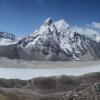 INSTAAR researcher Alton Byers and Wesleyan University professor Suzanne OConnell highlight research on a global increase in flooding due to melting glaciers. Nearly 2 billion people rely on water from alpine glaciers. But, as the climate warms, they are becoming more volatile.
INSTAAR researcher Alton Byers and Wesleyan University professor Suzanne OConnell highlight research on a global increase in flooding due to melting glaciers. Nearly 2 billion people rely on water from alpine glaciers. But, as the climate warms, they are becoming more volatile.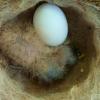 Small bird, big trick: How a hummingbird chick acts like a caterpillar to survive (CU Boulder Today)When Jay Falk and Scott Taylor first saw the white-necked Jacobin hummingbird chick in Panama’s dense rainforest, the bird biologists didn’t know what they were looking at. They later realized that it was potentially mimicking a poisonous caterpillar to avoid getting eaten.
Small bird, big trick: How a hummingbird chick acts like a caterpillar to survive (CU Boulder Today)When Jay Falk and Scott Taylor first saw the white-necked Jacobin hummingbird chick in Panama’s dense rainforest, the bird biologists didn’t know what they were looking at. They later realized that it was potentially mimicking a poisonous caterpillar to avoid getting eaten.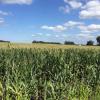 A new study in Nature Communications finds that agriculture is the main driver of short-term fluctuations in atmospheric carbon. Led by Danica Lombardozzi (CSU), the research team includes Will Wieder (INSTAAR, NCAR).
A new study in Nature Communications finds that agriculture is the main driver of short-term fluctuations in atmospheric carbon. Led by Danica Lombardozzi (CSU), the research team includes Will Wieder (INSTAAR, NCAR).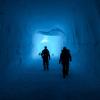 A hole drilled into Greenland's heart reveals ice ready to slide into the sea. An international group of researchers - including Tyler Jones - discuss their research and its often ominous implications. Don't miss the fantastic photos too!
A hole drilled into Greenland's heart reveals ice ready to slide into the sea. An international group of researchers - including Tyler Jones - discuss their research and its often ominous implications. Don't miss the fantastic photos too! Pollution-laden dust storms are depositing black carbon on the Himalayas. New research from INSTAAR’s Karl Rittger and collaborators reveals the process.
Pollution-laden dust storms are depositing black carbon on the Himalayas. New research from INSTAAR’s Karl Rittger and collaborators reveals the process.
 CU Boulder Chancellor Justin Schwartz recently dropped in on INSTAAR, where he discussed the institute’s research strengths and potential collaborations at the university level.
CU Boulder Chancellor Justin Schwartz recently dropped in on INSTAAR, where he discussed the institute’s research strengths and potential collaborations at the university level.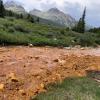 CU Boulder scientists, including Diane McKnight, recently presented results from water-quality sampling of a tributary to the Roaring Fork River. In addition to having high concentrations of certain metals, the samples contain rare earth elements. But what the latter means for health is unclear.
CU Boulder scientists, including Diane McKnight, recently presented results from water-quality sampling of a tributary to the Roaring Fork River. In addition to having high concentrations of certain metals, the samples contain rare earth elements. But what the latter means for health is unclear.- A refined mathematical model is now capable of predicting carbon inputs and outputs for freshwater lakes around the world, according to new research from INSTAAR’s Isabella Oleksy and collaborators. Their work could help scientists understand the role of freshwater lakes in the global carbon cycle.
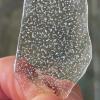 An investigation of ancient methane trapped in Antarctic ice suggests that global increases in wildfire activity likely occurred during periods of abrupt climate change throughout the last Ice Age. Led by Ben Riddell-Young (OSU/CIRES/NOAA), the team includes Reid Clark from our Stable Isotope Lab.
An investigation of ancient methane trapped in Antarctic ice suggests that global increases in wildfire activity likely occurred during periods of abrupt climate change throughout the last Ice Age. Led by Ben Riddell-Young (OSU/CIRES/NOAA), the team includes Reid Clark from our Stable Isotope Lab.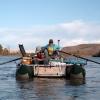 Michael Gooseff and collaborators are gathering the first-ever continuous, long-term water quality sample of the Colorado River's upper basin. INSTAAR senior communication specialist Gabe Allen joined them for three days on the river.
Michael Gooseff and collaborators are gathering the first-ever continuous, long-term water quality sample of the Colorado River's upper basin. INSTAAR senior communication specialist Gabe Allen joined them for three days on the river.

